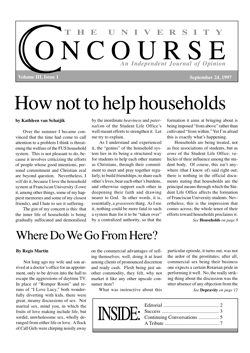Where do we go from here?
by Regis Martin
Not long ago my wife and son arrived at a doctor’s office for an appointment, only to be driven into the hall to escape the aggressions of daytime TV. In place of “Romper Room” and re-runs of “I Love Lucy,” both wonderfully diverting with kids, there were great, steamy discussions of sex. Not marital sex, mind you, in which the fruits of love making include life, but sordid, unwholesome sex, wholly deranged from either life or love. A flock of Call Girls were chirping noisily away on the commercial advantages of selling themselves; well, doing it at least among clients of pronounced discretion and ready cash. Flesh being just another commodity, they felt, why not market it like any other upscale consumer item?
What was instructive about this particular episode, it turns out, was not the ardor of the prostitutes; after all, commercial sex being their business one expects a certain Rotarian pride in performing it well. No, the really striking thing about the discussion was the utter absence of any objection from the audience who heard it; not to mention the poor souls in the doctor’s office by turns insulted and seduced by it. Indeed, there was not a whisper of disapproval from either group concerning a way of life which, until now, has been seen as squalid and degrading. Not a soul seemed to have taken the least notice of that dimension at all.
Do you see the problem we’re up against here? Not that sin doesn’t in fact exist, or that people who traffic in it cannot become shameless, but that no one seems to mind. Have we grown so callous to the corrupting effects of sin, so demoralized by the disorder around us, that none of it matters any more?
The other day a jury in Pittsburgh finally reached its verdict concerning a group of young women brutalized by local police in an Operation Rescue attempt six years ago. Their conclusion? None of the brutality mattered. The jury, in the words of the plaintiff’s attorney, “believed everything the women said, but they didn’t find that it shocked their conscience.” And why is that? Because, she concluded, “What can shock your conscience if you watch TV?”
Meanwhile, Marilyn Manson, apt symbol of American pop culture’s slide into a cesspool of depravity, continues to be the rage among the under-fourteen set. Deliberately affronting the sensibilities of mainstream parents—many of whose children now may be seen flocking to his concerts wearing T-shirts adorned with satanist signs and slogans (“American by Birth, Anti-Christ by Choice,” is a particular favorite)—his latest album, ANTI-CHRIST SUPERSTAR, has become something of an anthem of teenage angst.
So where in the name of God are the parents of these children? Have they grown so obtuse that the evidence of widespread degeneracy goes unnoticed altogether? Or are they sunk in the same quagmire of corruption as the purveyors of a culture determined on suicide, destruction, and disease? One is reminded of the question once put by Albert Jay Nock, namely: How can a civilization know whether or not it has fallen into a Dark Age? His answer is a deeply disturbing one: When all the lights having gone out, no one notices the darkness. Have they gone out? Has anyone noticed?
More and more we have got to face the fact that we cannot save this civilization, cannot arrest its accelerating descent into barbarism. A people besotted for a generation or more on images of deviance, violence and depraved sex cannot even be trusted to keep the machinery going, much less uphold the meaning of a civilized order. On the other hand, whoever said it was our job to shore up human civilization anyway? Our job is to try and sanctify our souls, and the souls of our children, pursuant to which civilization may or may not be saved. People bent on saving the world without first looking inward to try and save their souls, will certainly fail to save either. Our task is to first renew the interior life, to allow a shaft or two of God’s light to pierce our own darkness; then, and only then, will the encircling gloom and dark outside perhaps begin to fall away.
It is the lesson of the saints, after all, of holy men like Benedict, whose flight from the world into the mountain fastness of Subiaco, there to commune with God, attracted such attention to his fierce, single-minded joy, that it soon drew others to a common life of faith, on the strength of which a great movement began whose chief and lasting fruit would be the Christianization of the West. There is no reason why it cannot be done again. But not without saints, not without the witness of holy men and women. The rebuilding of a ruined world will begin when enough people fall to their knees, their minds undistracted by the fate of the world, their hearts set on God, on the life of God.
And one last thing: Turn off the TV.
Dr. Martin is an Associate Professor of Theology at FUS.


